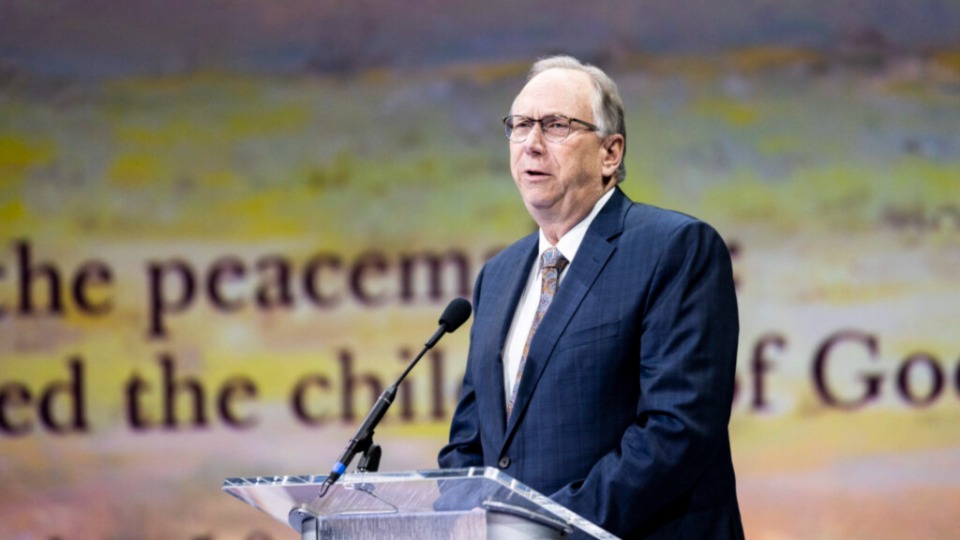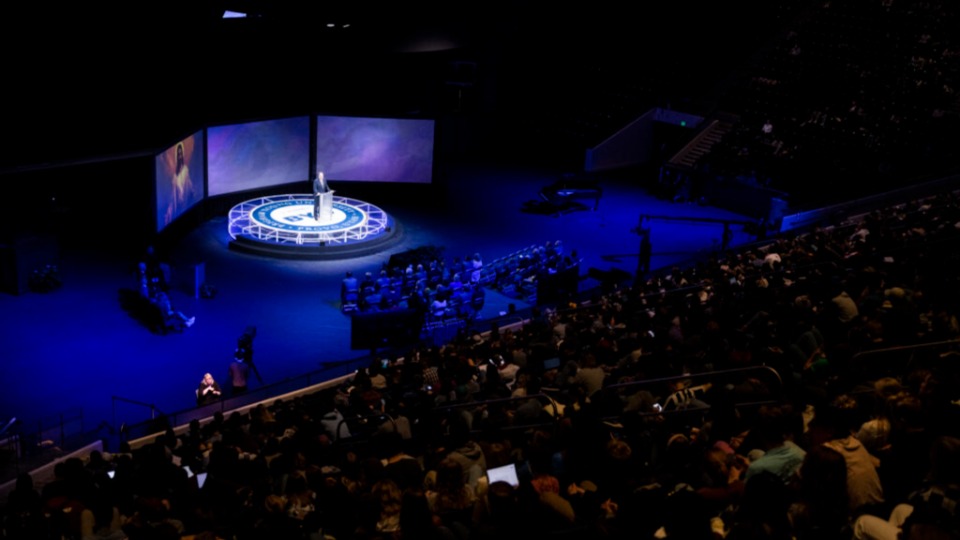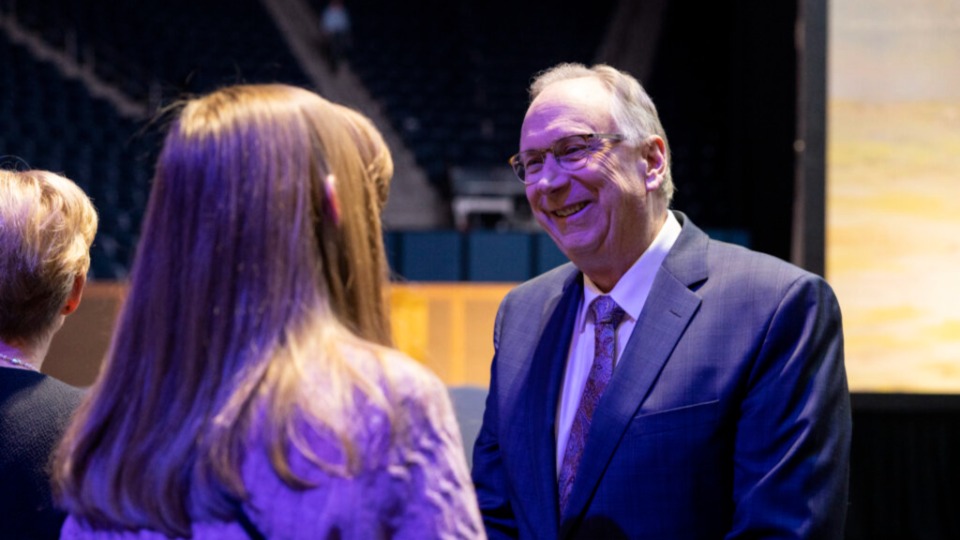
This story appears here courtesy of TheChurchNews.com. It is not for use by other media.
By Jason Swensen, Church News
PROVO, Utah— “Influencers” is a contemporary label conferred upon individuals who can sway target audiences to a particular product or organization.
Today’s so-called influencers, taught Elder Vern P. Stanfill, a General Authority Seventy, during the Tuesday, March 1, devotional at Brigham Young University, can change the way others dress, think or use their time.
The persuasive power of such influencers often defies reason, yet they can change the world, at least for a time.
“Perhaps time is the litmus test,” Elder Stanfill said. “When we cross to the other side of the veil, will it matter to us that we have an iPhone 13 or will it be an act of kindness that brought us peace? Those who make a difference change generations by bringing people closer to the Savior — these actions will be eternally remembered.”
Making an eternal difference in the lives of God’s children requires doing things in the Savior’s way.
“It requires more than being on the forefront of the latest cultural or social issue,” he said. “It requires a quiet awareness of the problems, sufferings, desires and needs of those around us. The difference I am talking about demands compassion.
“Compassion is different than empathy or sympathy in that its very root means to ‘suffer with.’ It requires action and is usually done individually in small ways. But generations may be changed.”
‘Blessed Are the Peacemakers’
During his recent gospel study, Elder Stanfill pondered Christ’s Sermon on the Mount. Given today’s culture of strife, division and anger, he was particularly touched by Matthew 5:9: “Blessed are the peacemakers: for they shall be called the children of God.”
Yes, a “peacemaker” is one who literally makes peace, resolves conflicts and uses calming words to bring others to his or her way of thinking, Elder Stanfill said. “But I believe the Savior is speaking of another kind of peacemaker. I believe He is speaking of those who extend the peace that He offers. They act in peace, peace is written on their countenances and they represent the Prince of Peace.”
Perhaps a peacemaker is also one reconciles with God and then helps others do the same.
“Now, if you are thinking that being a peacemaker is too lofty an aspiration for you, I want to assure you that it is not,” Elder Stanfill said. “That is the beauty of it. Everyone can develop this attribute. If we look to the ministry of Christ, we see many examples of how He extended peace and comfort to those in need and helped them to draw closer to God.”
The Lord’s exchange with the woman at the well, found in John 4, is such an example. The Savior lovingly taught the woman and testified of His eternal mission. She received a spiritual witness of Him. The woman then wanted to share that peace with others, hurrying back to town and returning with more people for Jesus Christ to teach.

“She literally brought people to Christ. She goes from outcast to peacemaker as she declares His divinity,” Elder Stanfill noted.
Another divine example of peacemaking is found in Joseph Smith’s sincere petitions to the Lord during his incarceration in the cold, filthy Liberty Jail, as recorded in Doctrine and Covenants section 121.
“The Savior teaches Joseph in this experience,” Elder Stanfill said. “He turns the young Prophet’s heart and mind to Him and to the eternities offering healing, understanding and comfort.
“This instructive scripture helps us understand an eternal model of extending the Savior’s peace to others. He comforts, He teaches and He promises great blessings. He lifts the vision from the here and now to the eternities and embraces the troubled with hope and love.”
Many people find themselves, figuratively, locked in Liberty Jail. They are confused, frustrated and hopeless — and their patience wears thin waiting for divine intervention.
“It is not easy, yet we can find peace when our faith overcomes our fears and doubts,” Elder Stanfill assured. “Often this comes as others reach out with love and concern — their faith shoring up our own.”
Peacemakers Bless Others
Such peacemakers can bless the lives of others in everyday interaction. Elder Stanfill shared the experience of visiting with a woman named Sister Gomez who had emigrated from Cuba to Canada. Sister Gomez initially struggled to navigate living in a new place, experiencing a different culture and trying to learn a foreign language. She became depressed, feeling alone and forgotten.
Then one day, during a visit to the park with her children, Sister Gomez felt a tap on her shoulder. She turned to see a woman who asked if she could sit down and if their children could play together.
The play dates continued, and the two women became close, trusted friends. Eventually, Sister Gomez accepted her new friend’s invitation to attend Church services. She was warmly welcomed by the local Latter-day Saints. Eventually, she was taught by missionaries and was baptized. She again felt loved.
“I have never met [Sister Gomez’s] friend, but I feel that she was a peacemaker in the truest sense,” Elder Stanfill said. “She offered peace to a very troubled soul by reaching out with a simple tap on the shoulder. Then she listened, and listened, and listened. With her friendship, she brought Sister Gomez peace by bringing her closer to the Savior.”
The world desperately needs such peacemakers, who will be remembered for eternity for making a difference.
Elder Stanfill taught that being a true “son or daughter of God” is reserved for those who are followers of Jesus Christ. They are true disciples who understand and reflect Christ’s pure love.

Moroni 7:47 teaches that charity “is the pure love of Christ … and whoso is found possessed of it at the last day, it shall be well with him.”
Then, in the next verse, Moroni exhorts his readers to “pray unto the Father with all the energy of heart, that ye may be filled with this love, which he hath bestowed upon all who are true followers of his Son, Jesus Christ; that ye may become the sons of God; that when he shall appear we shall be like him, for we shall see him as he is; that we may have this hope; that we may be purified even as he is pure.”
Moroni’s promise, Elder Stanfill said, clearly ties those who feel and extend the pure love of Christ to the peacemaker.
“We take upon ourselves the name of Christ. We should learn of Him and do our best to emulate who He is,” he explained. “The person who can extend the peace the Savior offers is the person who understands the pure love of Christ. This person looks upon others as God sees them and acts accordingly. And it shall be well with them.”
Elder Stanfill concluded by saying he hopes those gathered for Tuesday’s devotional would influence and change the world. Maybe one in the audience will invent a popular device or gadget. Another may find a cure for a disease or create a masterful work of art.
“I encourage you to use every talent and every bit of knowledge and inspiration you have to change the world, but while you are doing that, I invite you to make a difference in the world by being true peacemakers. For these will be called the children of God,” he said.
Copyright 2022 Deseret News Publishing Company